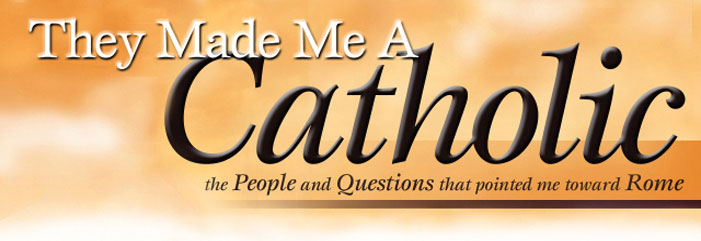|
This whole thing may sound like much ado about
nothing -- or, at least, much ado about something best left alone.
It seems so very complicated, doesn't it? Why would anyone actually
take it upon themselves to unravel whether Protestantism spent
the last five hundred years heading in the wrong direction? What
audacity! What nerve!
If you were to pick up one of the "Why
I became a Catholic" books in our recommended reading section,
the author's pilgrimmage would, I admit, seem like a long series
of complicated questions. You might find yourself scratching
your head at his or her tenacity. That's because many of these
converts were Protestant ministers and avid Bible readers who
felt it necessary to nail down every possible objection.
In all honesty, however, I felt a very different
necessity. I felt this should be a simple, straightforward process.
Why? Because of my strong belief that God has spoken and that
God's message is meant for everyone. The ability to read is not
a prerequisite for salvation. Neither is Bible scholarship. Neither
is freedom from mental illness or debilitating birth defects.
In my heart of hearts, I believe, with the
Bible-only Christian, in a salvation simple enough to save every
last human being. When I would visit my
grandmother, a dedicated member of Antioch Baptist Church but
not, by nature, a Bible scholar or theologian, I would think,
"It's one thing for a seminary graduate to work his way
through all these questions, but what about my grandmother? And
what about me? I'm no seminary graduate, myself! Are only fired-up
Bible scholars meant to unravel this mystery? No, I don't think
so."
In the end, a good friend of mine, Rod Bennett,
shared an idea that helped to clinch my decision. There is nothing
simpler, Rod pointed out, than one Church, one visible Body of
Christ, saying to everyone, "Do you want to be with God?
Come on in."
|
My search really only amounted to the trouble
it took to peel away various biases -- so that
I could actually, finally see a very simple truth that had always
been there. That truth is the Church herself.
Stepping through the door of that Church was
no Hallmark moment, along the lines of "I'm happy for Lint.
He likes the statues and the incense," or "I'm happy
for Lint. He needs the structured environment." Nor were
my first experiences with Catholics in Catholic instruction classes
very promising. Much of the time, my feeling was "I can't
go in there. No way."
And then I would read things like this: In
John's Gospel, the resurrected Lord appears to the gathered disciples
and says, "Peace be with you! As the Father has sent Me
so I am sending you." Breathing on them, He says, "Receive
the Holy Spirit. If you forgive anyone his sins, they are forgiven;
if you do not forgive them, they are not forgiven." (John
20:19-23 NIV)
Non-Catholics object to Confession on principle
they assert that God would never give men power to forgive
sins, not even the apostles and not even forgiveness by proxy
"in the name of Christ". And yet, there you have it
in John's Gospel. He did it.
The Son of Man was condemned for forgiving
sins. People didn't realize he was God in the flesh. Today's
Bible-only Christian condemns the Catholic Church for behaving
like Christ's presence in the world. He doesn't realize or can't
accept the strange, supernatural degree to which the Church works
"in persona Christi" as the Body of Christ. As
the Father sent Me so I am sending you.
Two thousand years ago, people were faced
with the strangeness of Christ. Might not people respond with
similar incredulity today when faced with His Body, the Church?
I submit to you, dear reader, that the Catholic Church seems
strange because it is strange. And I encourage you to find out
why.
|

